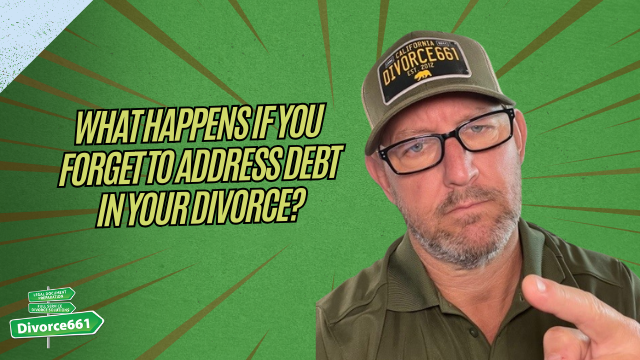What Happens If You Forget to Address Debt in Your Divorce?
Divorce is a complex and often emotionally charged process, where the focus usually centers on dividing assets like the family home, savings, and other valuables. However, one critical aspect that sometimes gets overlooked is the division and management of debt. What happens if debts are not properly addressed in your divorce agreement? This question is more important than many realize, especially in community property states like California.
Tim Blankenship of Divorce661, a trusted expert on California divorce law, sheds light on the risks of forgetting to include debts in divorce paperwork and explains how to avoid or fix these potentially costly mistakes. Drawing from real client experiences and professional practice, this article will guide you through why debt division matters, the consequences of omission, and how to safeguard your financial future during and after divorce.
Understanding Debt in Divorce: California’s Community Property Rules
In California, the law treats debts incurred during marriage as community debts, meaning both spouses are generally responsible for them regardless of whose name is on the account. This includes credit cards, loans, mortgages, and other financial obligations acquired during the marriage.
Tim Blankenship explains, “Any debt acquired during the marriage is generally considered community debt and should be divided in the divorce, just like your property.” This legal framework means that debts must be disclosed and assigned fairly in the divorce judgment to avoid future liability issues.
Unlike assets, which spouses want to claim and protect, debts are often overlooked or underestimated. Yet ignoring them can lead to serious financial consequences. The division of debt is just as important as dividing assets because it defines who is legally responsible for paying off what after the marriage ends.
Types of Debts to Include
- Credit card balances
- Personal loans
- Car loans
- Mortgages and home equity lines of credit
- Medical bills
- Business debts acquired during marriage
Failing to list any of these debts in the divorce decree can leave one spouse vulnerable to creditors, even if the divorce agreement states otherwise.
The Risks of Forgetting to Address Debt in Your Divorce
What if a debt is accidentally left out of the divorce judgment? Unfortunately, creditors do not recognize divorce agreements. They pursue payment from whoever is legally obligated on the account, regardless of what the divorce decree says.
Tim Blankenship shares a cautionary tale from his practice: “We helped a client who forgot to list a joint credit card in their divorce. A year later, the creditor came after them when their ex stopped making payments.” This situation highlights the real-world consequences of omission—debts can come back to haunt you financially long after the divorce is finalized.
This scenario is all too common. A spouse may believe a debt was assigned to the other party, but if creditors do not receive payment, they will seek repayment from all parties responsible on the account. This can damage credit scores, cause stress, and even lead to legal action.
Why Creditors Don’t Care About Your Divorce Agreement
Creditors’ primary concern is collecting the debt. They have no legal obligation to enforce your divorce decree, which is a private agreement between spouses. The divorce judgment does not change the contractual obligations you signed with lenders or credit card companies.
Therefore, if a debt remains in your name, you remain liable, regardless of who was supposed to pay it post-divorce. This is why it is crucial to make sure all debts are properly identified and assigned in the divorce paperwork.
How Divorce661 Helps Clients Avoid Debt-Related Pitfalls
At Divorce661, Tim Blankenship and his team take a proactive approach to debt management in divorce cases. They walk clients through a comprehensive debt inventory process as part of every divorce case. This ensures that all debts—big and small—are disclosed and accounted for.
“We make sure all debts are disclosed and divided so nothing gets left out and comes back to haunt you,” Tim says. This thoroughness helps clients avoid the common mistake of overlooking debts, which can result in costly post-divorce problems.
The Debt Inventory Process
- List all liabilities: Every credit card, loan, mortgage, and outstanding bill is identified.
- Verify balances: Confirm the current amounts owed to avoid surprises.
- Assign responsibility: Decide which spouse will pay each debt after divorce.
- Include in judgment: Ensure all debts and their assignments are clearly documented in the divorce decree.
By addressing debt head-on, Divorce661 helps clients protect their financial future and reduce the risk of creditor claims after divorce.
Fixing Debt Omissions After Divorce: What Are Your Options?
If you have already finalized your divorce but realize a debt was left out, don’t panic. There are legal remedies to correct these omissions, though they can be more complicated than addressing everything during the initial divorce.
Tim Blankenship explains two common solutions:
- Stipulated Agreement: You and your ex-spouse can mutually agree to amend the debt division and submit a stipulated agreement to the court for approval.
- Motion to Modify Judgment: If an agreement cannot be reached, you can file a motion with the court to modify the divorce judgment to include the omitted debt.
Both options require legal guidance and cooperation from both parties. Tim advises, “It would have been easier to address it during the divorce,” but acknowledges that post-judgment fixes are possible and sometimes necessary.
Why Act Quickly?
The longer a debt omission goes uncorrected, the greater the risk that creditors will pursue the wrong spouse, damaging credit and causing financial hardship. Prompt action helps clarify responsibilities and protect your creditworthiness.
Practical Tips for Managing Debt in Divorce
Whether you are just starting the divorce process or have already finalized, here are some actionable tips to keep your debt situation under control:
1. Conduct a Full Debt Review
Make a comprehensive list of all debts, including those in joint names and those in individual names. Don’t forget less obvious debts like medical bills or store credit cards.
2. Gather Documentation
Collect recent statements, loan documents, and credit reports to verify balances and terms.
3. Communicate Clearly with Your Spouse
Discuss who will be responsible for each debt post-divorce. Document these agreements carefully.
4. Include Debts in Your Divorce Judgment
Work with your attorney or divorce professional to ensure all debts are listed and assigned in the final divorce paperwork.
5. Monitor Credit Reports After Divorce
Regularly check your credit report to ensure debts are being paid as agreed and to detect any unexpected claims.
6. Consider Refinancing or Removing Your Name
Where possible, refinance loans or transfer accounts to release your name from joint debts, reducing future liability.
Why Choosing Divorce661 Is a Smart Move for Your Divorce
Divorce661 specializes in helping couples in California navigate divorce with a focus on thoroughness and client protection. Their flat-fee, full-service approach includes:
- A detailed debt inventory and division process
- Expert guidance to prevent common divorce mistakes
- Post-judgment support for fixing omissions or disputes
- Free consultations to clarify your unique situation
Tim Blankenship’s commitment to transparency and comprehensive service makes Divorce661 a trusted resource for anyone facing divorce in California.
Final Thoughts: Don’t Let Forgotten Debt Derail Your Divorce
Dividing assets is only half the story in divorce. Properly addressing debts is equally important to protect yourself from future financial headaches. California’s community property laws mean that both spouses can be held liable for debts incurred during the marriage, so omitting debts from your divorce agreement can have serious consequences.
As Tim Blankenship emphasizes, “If a debt isn’t listed in your judgment, it can create major issues later. Creditors don’t care what your divorce agreement says.” The best approach is to be proactive: conduct a full debt inventory, disclose all liabilities, and have them clearly assigned in your divorce paperwork.
If you’ve already finalized your divorce and fear you forgot to include a debt, don’t delay in seeking professional help. Whether through stipulated agreements or motions to modify the judgment, there are legal avenues to protect yourself.
For anyone going through divorce in California, working with a knowledgeable professional like Tim Blankenship at Divorce661 can make all the difference. Their expertise ensures your divorce is comprehensive, fair, and protects you from future financial risks.
To learn more or schedule a free consultation, visit Divorce661.com. Protect your financial future and get the peace of mind you deserve.
Join the Conversation
Have you or someone you know forgotten to include a debt in a divorce? What challenges did you face? Share your experiences and questions below—let’s talk and support each other through this important aspect of divorce.



